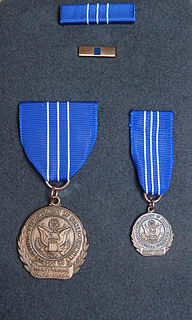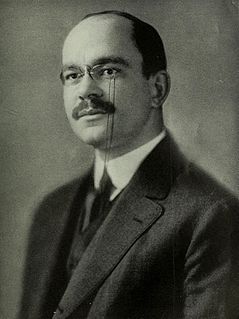
The United States Department of State (DOS), commonly referred to as the State Department, is the federal executive department that advises the President and conducts international relations. Equivalent to the foreign ministry of other countries, it was established in 1789 as the nation's first executive department. The current Secretary of State is Mike Pompeo, who ascended to the office in April 2018 after Rex Tillerson resigned.
The Commendation Medal is a mid-level United States military decoration which is presented for sustained acts of heroism or meritorious service. For valorous actions in direct contact with an enemy, but of a lesser degree than required for the award of the Bronze Star Medal, a Commendation Medal with "V" Device or Combat "V" is awarded; the "V" device may be authorized for wear on the service and suspension ribbon of the medal to denote valor. On January 7 2016, The "C" Device or Combat "C” was created and may be authorized for wear on the service and suspension ribbon of the Commendation Medal to distinguish an award for meritorious service or achievement under the most arduous combat conditions. A Commendation Medal with Combat Device is unofficially named the “Combat Commendation” and is often considered to be a higher level form of the Commendation Medal, regardless of the Awarding Branch. Retroactive award of the “C” device is not approved for medals awarded before 7 January 2016. Each branch of the United States Armed Forces issues its own version of the Commendation Medal, with a fifth version existing for acts of joint military service performed under the Department of Defense.

The United States Foreign Service is the primary personnel system used by the diplomatic service of the United States federal government, under the aegis of the United States Department of State. It consists of over 13,000 professionals carrying out the foreign policy of the United States and aiding U.S. citizens abroad.

The Bureau of Diplomatic Security, more commonly known as Diplomatic Security, or DS, is the security and law enforcement arm of the United States Department of State. DS is a world leader in international investigations, threat analysis, cyber security, counterterrorism, security technology, and protection of people, property, and information. DS's mission is to provide a safe and secure environment for officials to carry out U.S. foreign policy.

The Foreign Service Institute (FSI) is the United States federal government's primary training institution for employees of the U.S. foreign affairs community, preparing American diplomats as well as other professionals to advance U.S. foreign affairs interests overseas and in Washington. FSI provides more than 800 courses—including over 70 foreign languages—to more than 170,000 enrollees a year from the Department of State and more than 50 other government agencies and the military service branches. FSI is based at the National Foreign Affairs Training Center in Arlington, Virginia.
Awards and decorations of the United States Air Force are military decorations which are issued by the Department of the Air Force to Air Force service members and members of other military branches serving under Air Force commands. Of all five branches of the United States Armed Forces, the United States Air Force currently maintains the highest number of active awards and decorations, including many without equivalent in any other service.

The Award for Heroism is an award of the United States Department of State. It is presented to employees of State, USAID and Marine guards assigned to diplomatic and consular facilities in recognition of acts of courage or outstanding performance under unusually difficult or dangerous circumstances, whether or not in connection with the performance of assigned duties.

The Distinguished Honor Award is an award of the United States Department of State. Similar versions of the same award exist for the former U.S. Information Agency, Arms Control and Disarmament Agency, and USAID. It is presented to groups or individuals in recognition of exceptionally outstanding service or achievements of marked national or international significance.

The Superior Honor Award is an award of the United States Department of State. Similar versions of the same award exist for the former U.S. Information Agency, Arms Control and Disarmament Agency, and USAID. It is presented to groups or individuals in recognition of a special act or service or sustained extraordinary performance covering a period of one year or longer.

The Meritorious Honor Award is an award of the United States Department of State. Similar versions of the same award exist for the former U.S. Information Agency, Arms Control and Disarmament Agency, and USAID. It is presented to groups or individuals in recognition of a special act or service or sustained outstanding performance.
The Senior Foreign Service (SFS) comprises the top four ranks of the United States Foreign Service. These ranks were created by the Foreign Service Act of 1980 and Executive Order 12293 in order to provide the Foreign Service with senior grades equivalent to general- and flag ranks in the military and naval establishments, respectively, and to grades in the Senior Executive Service. Like military ranks and other Foreign Service ranks, the Senior Foreign Service grade system assigns rank in person, not rank in position.

Francis Xavier "Frank" Taylor was the Under Secretary of Homeland Security for Intelligence and Analysis at the U.S. Department of Homeland Security (DHS), nominated by President Obama in 2014. In that role, he provided the Secretary, DHS senior leadership, the DHS components, and state, local, tribal and private sector partners with homeland security intelligence and information they need to keep the country safe, secure and resilient. DHS Office of Intelligence and Analysis is a member of, and the Department’s liaison to, the U.S. Intelligence Community.

The Thomas Jefferson Star for Foreign Service is an award of the United States Department of State. It is presented to employees of State, USAID, and civilian contractors assigned to diplomatic and consular facilities for events that lead to death or serious illness or injury. It is roughly comparable to the U.S. military's Purple Heart, but since the criteria for the award is so strict, nearly all of them are awarded posthumously.

The Secretary’s Award is an award of the United States Department of State. It is presented to employees of State, USAID and Marine guards assigned to diplomatic and consular facilities in recognition of sacrifice of health or life, in the performance of official duties. It is somewhat similar in function to the U.S. military’s Purple Heart medal, though it tends to only be issued for serious injuries that are directly related to official duties.

The Award for Valor is an obsolete award of the United States Department of State. It has since been replaced with the Award for Heroism. It was presented to employees of State, USAID and Marine guards assigned to diplomatic and consular facilities in recognition of acts of valor or outstanding performance under unusually difficult or dangerous circumstances, whether or not in connection with the performance of assigned duties.
The Vietnam Civilian Service Award is a discontinued award of the United States Foreign Service. It was presented to employees of the U.S. State Department, USAID and USIA assigned to diplomatic and consular facilities in Vietnam, or other civilian service in the airspace or territorial waters of Vietnam, greater than a year.















